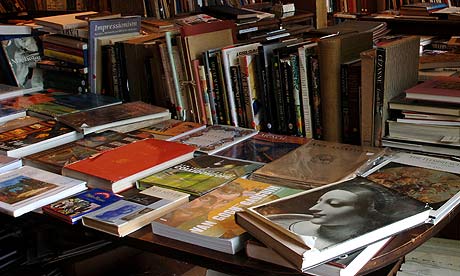
Between a slew of unwanted Christmas presents and a stack of new year's resolutions to clear out shelves, it's boom time for selling secondhand books online. But selling books online can feel pretty soulless, knowing the $0.89 cents (60p) you get for your ratty paperback isn't helping anyone else, and isn't really making you money anyway. Much better to take pot luck in a charity bookshop.
I think I probably dreamt of charity bookshops before I knew they existed: somewhere you could do one of your selfishly favourite things and pretend afterwards you were doing it selflessly. I worked in Oxfam bookshops all the way through university, and probably learned more sorting through donations than I did from all the lectures I ever went to. There was always a guilty pleasure after an eminent professor emigrated or died: the shop would be flooded with the most beautiful books I'd ever seen, as well as huge collections of books about things you never knew about or wanted to. I spent one afternoon sorting through boxes of books on the biological study of coprology – including a pop-coprology book for beginners called Merde.
Sitting on top of the pile are Amnesty International's bookshops. Books For Amnesty have perfected the balancing act of secondhand bookshops, between tidy and cosy, professional and off-beat. The manager in Cambridge, Lenore Muskett, knows more about books and manuscripts than anyone I've ever met, and her shop on Mill Road is the antithesis of the bargain-bin charity shop that expects your pity for its cause to override its sloppy standards: all the shop's assistants are trained how to spot collector's items, first and rare editions, and how to treat the book as an important object in its own right. The Brighton and Malvern stores are also notable for both their interesting buildings and collections.
It's no accident that Amnesty takes books so seriously. For all its sexy rebranding for the Live 8 wristband generation, Amnesty's real value remains in the important, unglamorous work of ongoing letter-writing campaigns by ordinary people on behalf of prisoners of conscience. Bookshops are the perfect way of fundraising for an organisation built upon the idea that dialogue can further social justice, that writing really matters.
Some argue that charity bookshops can only thrive in rich areas where residents are able to donate large numbers of high-quality books, that they're only another sign of gentrification. Booksellers have argued that since large organisations like Oxfam are more able to afford the exorbitant rents in affluent areas than independent traders, they're a further threat to independent bookshops. Writing on the Fidra blog, Vanessa even suggests that planners should place limits on the number of charity shops in an area. But aside from the moral arguments about the importance of charity bookshops, this seems to overlook the opportunity that charity bookshops add to the community space, bringing in more customers to all secondhand bookshops in the area.
And far from taking over the market, charity bookshops are still losing out themselves. Although Amnesty and Oxfam bookshops are online, and make an increasing percentage of their profits from selling donations – particularly of rare books – over the internet, their duty to raise money for their organisation means it is both impractical and wrong for them to sell donations online for a pittance.
As David Streitfeld argues, everyone knows deep-down that by buying secondhand – whether on Amazon, a chain bookstore's secondhand section, or at Oxfam – you're committing a bit of a social sin by not giving your money to the writer and publisher of the book. But at least if you're buying from a charity bookshop, your money is going to someone who really needs it. Selling your unwanted Christmas books for a few pennies on Amazon isn't going to earn you much anyway, so why not take it down to your local charity bookshop. You might even find something you really want in return.

